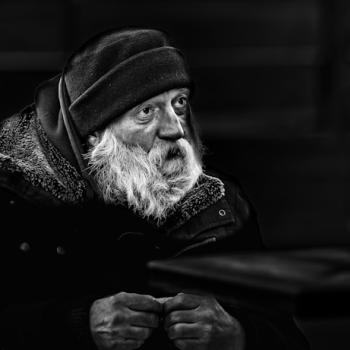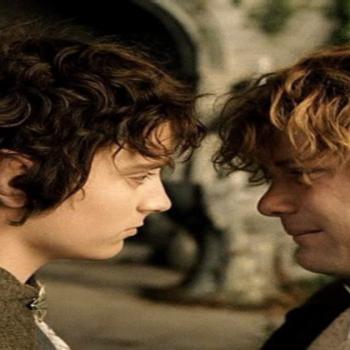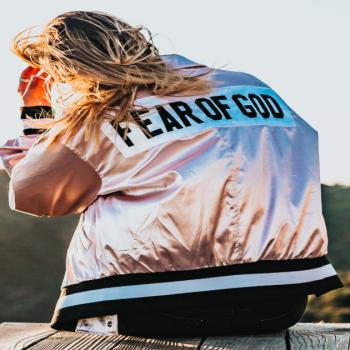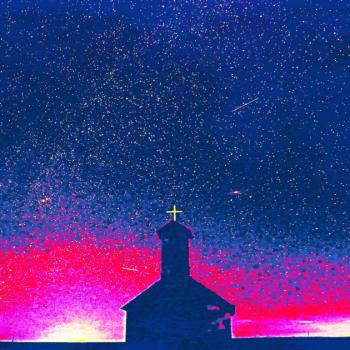Who is Jesus? It is a question that has been asked throughout history, from the religious leaders of the first century to the early church councils up through the ‘unbiased’ naturalists of the Jesus Seminar and the best-selling novel, soon to be movie, The Shack.
In answering the question, Who is Jesus?, it seems wise to not simply form an opinion based on modern ideas and experiences, but rather to start with those who knew him. John, the son of Zebedee and brother of James, was a disciple of Jesus who walked with him and knew him as well as anyone. In the first chapter of the Gospel which he wrote, he tells us that Jesus was both a comforting and threatening light.
“The true light, which gives light to everyone, was coming into the world. He was in the world, and the world was made through him, yet the world did not know him. He came to his own, and his own people did not receive him. But to all who did receive him, who believed in his name, he gave the right to become children of God, who were born, not of blood nor of the will of the flesh nor of the will of man, but of God.” (John 1:9-13, ESV)
This passage, when you first read it, seems to beg the question, why does the world need light? If you ever travel to Carlsbad, NM you can have a great experience underground, in the Carlsbad Caverns. They’re large rooms underground that you can walk through with huge rock formations- stalagmites and stalagtites- that look like icicles jutting up and down out of the rock. But, the best part, or maybe the worst part, depending on who you ask, is when the tour guide has everyone turn out their lights. It’s pitch black- you can’t see the person next to you, you can’t even see your hand if you put it in front of your face.
That’s how the prophet Isaiah pictured the world 700 years before Christ. In Isaiah 60, he writes, “darkness shall cover the earth, and thick darkness the people.” Now, he’s not talking about physical darkness; as if all fire, electricity and the sun were to suddenly go out. He’s talking about moral and spiritual darkness. He is envisioning a world where evil reigns.
It’s the same picture Moses gives in Genesis 6: “The Lord saw the wickedness of man was great in the earth, and that every intention of the thoughts of his heart was only evil continually.” It’s the same picture the Apostle Paul paints in Romans 3: “None is righteous, no, not one; no one understands; no one seeks for God… no one does good, not even one.”
These biblical authors all agree on the same idea- The world has a proclivity towards evil.
Now, there are a lot of people who would say, “Wait a second, there are a lot of good people in the world. I don’t believe the world is evil.” And there are certainly a lot of outwardly good people in the world. But, when you look at the statistics, I’m not sure too many of us could disagree with the biblical writers. Think about just the last century on earth. In the 20th century, 8 million soldiers and 12 million civilians were killed in World War 1. About 60 million people were killed in World War 2, including 6 million Jews exterminated by Hitler. Josef Stalin’s regime was responsible for murdering at least 7 million of his political enemies. We saw massive genocides in Rwanda, Indonesia, the Congo, Cuba, Cambodia, Croatia, North Korea, Yugoslavia, Uganda, Armenia, Liberia, Iran… and on and on.
My daughter recently asked me, “Why is Europe so post-Christian?” Think about all of those deaths. Imagine the moral and spiritual darkness in those places at times, so dark you could hardly see your neighbor. And the obvious question on so many lips was, “Where is the light? Why has God left us in such darkness?” The conclusion? ‘There must not be a God if there’s this much darkness.’
But, John says, there is a light that illuminates the whole world. And that light has a name, Jesus. John tells us what every Christian knows: that Jesus brings light to the darkest of places. He’s with us in the darkest of times. He’s in the trenches, he’s in the gutter, he’s at the death bed.
But, what John tells us goes against a popular idea that sounds something like this: “Jesus is just for Christians.” Verse 6 says that ‘the true light enlightens everyone.’ Jesus makes the world a better place for everyone.
How does He do that? First, through His message of love and hope. That’s a message that everyone needs and that actually produces change in the world. Secondly, through his atoning death. He paid the price for our sins so that we could be forgiven and know God. And thirdly, through the work of the church- in loving the world, feeding the poor, helping the sick, starting the first universities, founding the first hospitals and medical clinics all over the world…
We call this concept ‘common grace.’ The idea that God gives good gifts to everyone in the world- sunshine falls everywhere; everyone has access to friends and good wine. It’s grace, and it’s extraordinarily generous of God- it’s not common in the sense of being boring; it’s common in the sense that everyone gets it.
But, there’s an interesting effect that light has: some really want it, and are grateful for it. But for others, it’s troubling. As John says in verses 10 and 11, “He was in the world, and the world was made through him, yet the world did not know him. He came to his own, and his own people did not receive him.” You’d think everyone in darkness would want light. But, John says that’s not the case- when the true light came, it was rejected.
In the 2016 movie remake of The Jungle Book, we see that in the jungle, humans are both revered and feared for the same reason: because they have ‘the red flower,’ fire, which has both immense power for good and for destruction. Fire can help us cook and stay warm, but it can also destroy a whole forest or city.
Jesus is like fire, both a comforting and threatening light. He’s comforting to those who are tired of the darkness and want to see; to those who are willing to come into the light and to be known. But He’s threatening to those who don’t want to be known. He is a threat to those who are building their own kingdoms in the dark, and who are making money off of other people being in the dark.
This goes against another popular idea: “Jesus is loving and would never make anyone feel bad.” I often hear some equivalent of this from people committing adultery, ‘Well, I know what the Bible says, but God and I are good, I know He just wants me to be happy.”
It’s true that Jesus is loving, in fact He’s the source of love. But, love doesn’t uncritically accept whatever I want to do. When two terrorists set off a bomb at the Boston Marathon, we didn’t say, ‘Oh, let them go, they just love their ideals.’ Jesus is loving, but that doesn’t mean He’s soft. And His holiness and perfection make people feel guilty around Him. There are many people who want nothing to do with Him. John says that even His own people- the Jewish people- largely rejected Him.
Verse 12 says, “But to all who did receive him, who believed in his name, he gave the right to become children of God.” Here, John uses the analogy of childbirth- that believing in Jesus and receiving Him as your Lord is like being born a second time. Your first birth was physical and bloody, and made you a child of human parents. But your second birth is spiritual- and makes you a child of God. In fact, the second birth is a lot like Jesus’ birth- by the will of God, not man.
This goes against another Popular Idea: “God is everyone’s Father, and Christ is everyone’s brother.” Nope. The family of God is limited. But it’s not limited by ability, or social status, or gender, or race. It’s only limited by one thing: Do you receive Jesus and believe He is who He says He is?
If there is one resolution you make this year, make sure you can answer that question, “Who is Jesus?” Because your eternal destiny hangs on the answer.
I know that’s a scary thought for a lot of people- following Jesus is scary because of what you’ll have to give up. And it feels like giving up control of your life. I’ll never forget my running partner in Northern Virginia, after the terrorist attacks on 9/11, saying, “That’s the problem with organized religion. That’s why I quit going to church.”
Most ideologies ask their disciples to give up their lives for the cause. And Jesus is no different. He says, “If anyone would come after me, he must take up His cross and follow me.” But, there’s a huge difference in what comes before that. Because before Jesus asks you to give up your life for Him, He gives up His life for you. And he doesn’t take away your moral responsibility- He adds to it, and He gives you wisdom to go along with it.
So, don’t check your brain at the door. Examine the claims of Christ. See if the light is real, if it will change your darkness. And be honest about the darkness. Sometimes we don’t want to think about the darkness because it scares us, and a lot of times we don’t like to talk about the darkness because it makes people uncomfortable. But, not talking about the hard things doesn’t make them go away.
I read a great article in the Washington Post by a professor named Eleni Pinnow whose sister committed suicide. “By the time I sat down to write my sister’s obituary I knew that the opening line could only be one thing: Aletha Meyer Pinnow, 31, of Duluth died from depression and suicide on February 20, 2016. I had to be honest. I had to tell the truth… Depression stole decades of our lives together. Depression lies. I have to tell the truth. My sister’s depression fed on her desire to keep it secret and hidden from everyone. I could not save my sister. I could not reach my sister through her depression. Aletha slipped from my grasp and I cannot bring her back. I can only urge others to distrust the voice of depression. I can plead for people to seek help and treatment. I can tell the truth.”
Be honest about the darkness. But, don’t stop at the darkness. That’s where cynics stop. If the Christian story is true, the light wins.
The singer David Wilcox says it so well. He uses the metaphor of a playwright in his song “Show the Way”:
“You say you see no hope, you say you see no reason we should dream
That the world would ever change, You say that love is foolish to believe
‘Cause they’ll always be some crazy, with an army or a knife
To wake you from your daydream, put the fear back in your life.
Look, if someone wrote a play, just to glorify what’s stronger than hate
Would they not arrange the stage, to look as if the hero came too late?
As if he’s almost in defeat, so it’s looking like the evil side will win
So on the edge of every seat, from the moment that the whole thing begins
It was love that mixed the mortar, it was love that stacked these stones
It was love that made the stage here, and made it feel like we’re alone
In this scene, set in shadows, like the night is here to stay
There is evil cast around us, but it’s love that wrote the play
For in this darkness love can show the way.”













